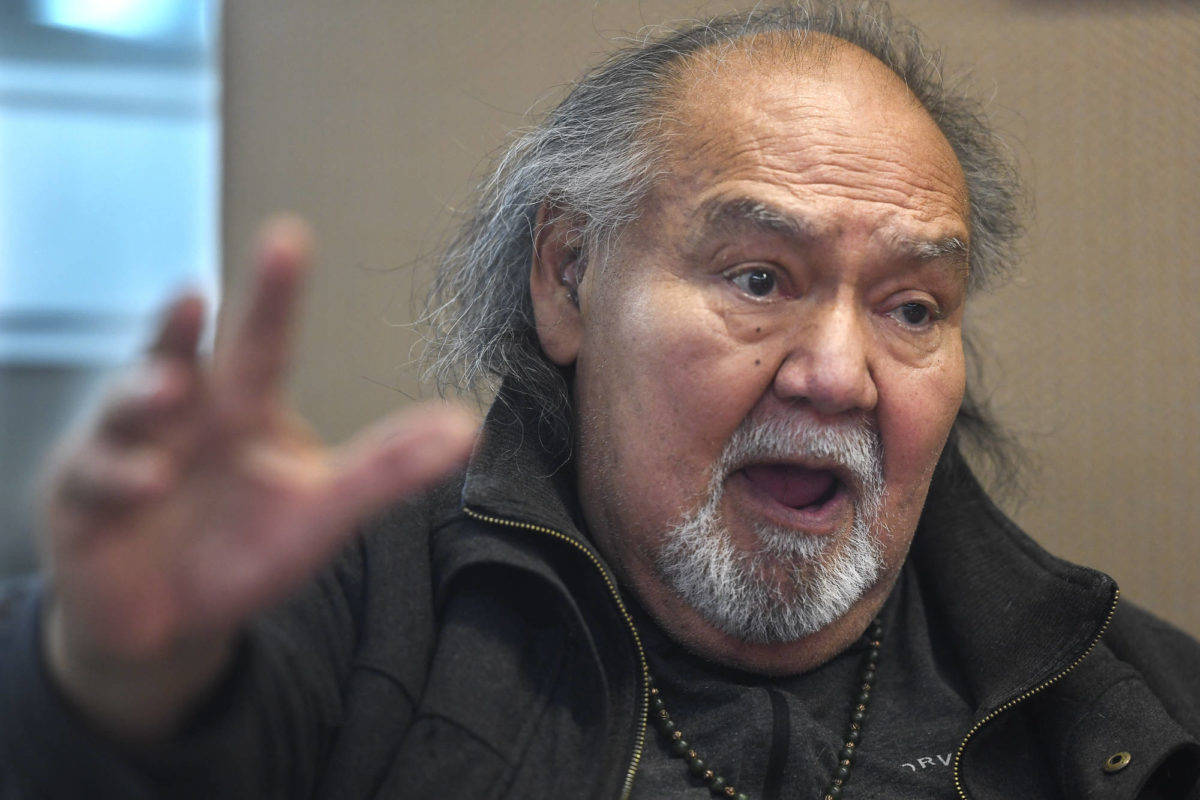This is a developing story.
Kingeisti David Katzeek, clan leader of the Shangukeidí, founding president of the Sealaska Heritage Institute and a Tlingit language and culture professor died last night, SHI said in a statement.
Statements made about Katzeek following the news spoke glowingly of his role as a clan leader and pioneer of Tlingit language and culture education.
“Our culture has gone through thousands of years of survival, we can see now through his teaching our students have learned our culture,” said Rosita Worl, president of Sealaska Heritage Institute said in a phone interview Thursday
She cited Katzeek’s role in leading the first Sealaska Celebration, a now-biennial ceremony celebrating Southeast Alaska Native heritage and culture, as being a pivotal moment for Native cultural revival in Southeast.
“The survival of Tlingit culture was very fragile. I don’t want to get into historical suppression but it was very real,” Worl said. “David led the first celebration in 1982, where we came out into the open and said our culture has survived. Our culture is relevant. He led that. He was responsible for that first celebration, the beginning of our cultural renaissance.”
Of all the memories Worl had of the late Katzeek, her favorite she said, had to do with his fondness for skiing. He enjoyed the sport, Worl said, but as a larger man perhaps wasn’t always in the best control of where he was going.
“People would always have to get out of his way,” she said. “I just love the image of this 300-pound Thunderbird roaring down the slopes.”
SHI’s statement did not list cause of death for Katzeek but said he died “unexpectedly” Wednesday night. In the statement, SHI said its Board of Directors had turned to the clan leader for guidance throughout its history.
“Time and time again we called on David for his guidance, strength, and wisdom. We could always count on his words to bring us balance,” said Ricardo Worl, clan nephew to Katzeek in the SHI statement. “David’s passing leaves us with an unimaginable void for our culture and traditional leadership, but we can take much comfort in knowing that he passed on all the knowledge he could in his lifetime.”
Katzeek was the one who suggested the name Yadaa.at Kalé, meaning “beautifully adorned face” for Juneau-Douglas High School when students there led a push to rename the school with a Tlingit-language name in 2019.
Many of the condolences pouring in on social media referenced Katzeek’s role as an educator and remembered his many visits to local schools to educate students about Alaska Native culture.
“I think he was a giant among giants among language advocacy,” said Central Council of Tlingit and Haida Indian Tribes of Alaska President Richard Chalyee Éesh Peterson.” I had the distinct pleasure to visit with him and to see him in action. I was always impressed by how he always spoke from a place of love and inclusiveness.”
Through their conversations together, Peterson said he believed Katzeek’s work with children was what motivated him to continue his work. Peterson said that Katzeek had expressed a special appreciation for being referred to as “Grandpa David” by his students in the Tlingit Language and Learning Program at Harborview Elementary School.
Peterson said he often saw other cultural values embodied in Katzeek.
“I remember listening to him speak, he was speaking in Tlingit and translating, and maybe he messed up and he started laughing. He had the ability to laugh at himself and valued that and treasured that, that we can make mistakes.”
Losing Katzeek has a significant impact on the community, Peterson said, and sent his condolences to Katzeek’s family. Katzeek’s daughter works for Tlingit and Haida, Peterson said, and he sees many of the same traits in her.
“He was so committed to our culture, such a model for that,” he said. “In my times that I’ve gotten to observe how thoughtful and introspective David could be, I really see that in his daughter.”
The University of Alaska Southeast, where Katzeek was a professor, issued a lengthy statement about his impact on Tlingit language and culture.
[‘I sense the presence of my ancestors’ Tlingit teacher talks about the power of language]
“At the outset of his tenure with Sealaska Heritage Foundation, there was little to no documentation of Tlingit worldview and language. His leadership priorities in culture and language were the groundwork to benefit generations to come,” UAS’ statement said. “His dedication to perpetuating Tlingit culture and honoring the vast intellect of an Indigenous people set the stage for the many aspects of culture and language.”
The UAS statement says Katzeek’s work on Tlingit language and culture included developing a font with Apple Inc. and supported groundbreaking work in both linguistics and anthropology.
“Kingeestí contributed to innumerable ways, including Alaska Native Corporation culture camps, curriculum development, and advocacy meetings to share his expertise,” the university said.
Recently, Katzeek served as the Chair of the Juneau Indian Studies Parent Board, as a member of the Juneau School District Tlingit Language Revitalization Task Force that included Alaska Native organizations of Juneau, University of Alaska Southeast, members of the school board, superintendent and staff, according to the UAS statement.
Rosita Worl said plans were already being laid for a virtual ceremony which was hoped to be as traditional as possible without having people in person. Katzeek, an Eagle, will have his regalia laid out, she said, and Naa Kaani, or in-laws of the Raven moiety, would moderate the ceremony.
But a kind of ceremony had already taken place, she said.
Worl said she had just come from a meeting with Katzeek’s students in the Tlingit language program at Harborview.
“It turned into almost a traditional ceremony,” she said. “Any Tlingit adult would have been so proud to see the fruit of David’s work, in that his students knew the formalities of our culture and cultural protocols.”
• Contact reporter Peter Segall at psegall@juneauempire.com. Follow him on Twitter at @SegallJnuEmpire.

